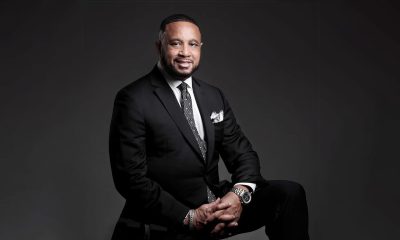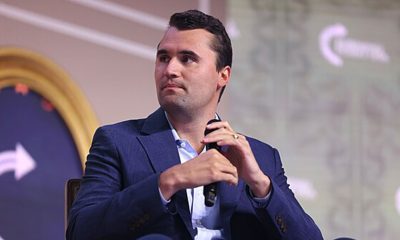Crime
Faith-based groups need to do more to help ex-offenders with second chances
THE BIRMINGHAM TIMES — The faith-based community must speak with one voice in creating second chances for people released from prison.
By Ameera Steward
The faith-based community must speak with one voice in creating second chances for people released from prison, a group of panelists said during a discussion this month at the Church at Brook Hills.

[/media-credit] Jessica Haney looks on as Kenneth Tyrone King speaks during the program.
The Prison Fellowship and Offender Alumni Association of Alabama hosted the event, “Unlocking Second Chances” and talked about the significance of second chances and the role played by faith-based institutions.
Panelists were Kenneth Tyrone King, public relations director, Offender Alumni Association; Pastor Keith Stanley, founder of WorkFaith Birmingham; and Jessica Haney, author and Celebrate Recovery Ministry leader and CrossFit coach which recently became involved with Unlocking Second Chances. The panel was moderated by Brent Leatherwood, director of strategic partnerships, The Ethics & Religious Liberty Commission.
It’s powerful when people speak with one voice, Haney said.
“It shows love, it shows unity…when the whole church, meaning the body of Christ all over, if they would do and be who they say they are, we wouldn’t be having the struggle to begin with,” she said. “If you really think about it, we’re powerful, we have the power to combat this whole issue [of formerly incarcerated people not getting second chances] if we would all get on the same page and do the things that we’re called to do.”
She added that [the church]has the means to make such a difference if we (would be unified, if . . . “quit being afraid to be uncomfortable, get out there, [and] get messy.”
“Full-time” Life Of Drugs
Haney told part of her story and said her mother worked a lot and her dad had an addiction and with no supervision she started making bad choices, doing drugs and got married twice before she turned 17 and “lived a full time life of drug addiction.”

[/media-credit] Jessica Hanley
She was incarcerated several times for drugs beginning at 17. “I was junkie. I lived like a junkie, talked like a junkie, acted like a junkie.” That was the way it would always be, she was told.. “That was what was fed to me my years of trying to get help, that I’m always going to have this disease, that I’m always going to struggle…’you’re always going to have to deal with this, you’re never going to get over it, you’re never going to find freedom from it’ and I used that for a crutch my whole life to say well nobody expects anything any different out of me.”
While she was in jail at Ottawa County she went through the Substance Abuse Prevention Program (SAP) “and I was ready for real help and real change, and I met the Lord and people say ‘jail house religion,’ I don’t care what you call it, all I know is it was freedom for me. It was where my chains were broke, it was where I found what could truly sustain me because I had exhausted every other avenue possible. I tried everything else…and nothing worked until I found a true relationship with God.”
Early on in her recovery, Haney said she “messed up.” Her husband couldn’t reach her, so he called a neighbor, who happened to be the deacon of the church.
She said the deacon walked into her house, “looks at my mess, gets me up, makes me a pot of coffee and she talks to me.”
“She don’t talk to me about my mess, she don’t even mention the obvious chaos that’s visible to see. She tells me about her mess…and I thought this lady was perfect….I wanted to be her when I grew up. She was perfect in my eyes, but she let me know that ‘hey I’m not perfect either, I struggle in a different area. This is the area I struggle in,’” said Haney.
That one conversation changed her life and let her know, “I can do this too,” she said. Haney concluded by going back to a statement she felt needed to be reiterated, “we need to be real and we need to love people.”
“Love For One Another”
Stanley said it’s important for the church to speak with one voice.
He said Jesus taught about our love for one another “. . . we can display that love together for one another and those formerly incarcerated or those that are struggling with addictions …when we can come together as one voice . . . we display…the power of the gospel in a way that the world takes notice,” he said.

[/media-credit] Pastor Keith Stanley, founder of WorkFaith Birmingham.
The church needs to set the example, Stanley said.
“I think the people who are not believers often look at us and wonder if that Christianity is real why there is so much division in different church buildings,” he said. “And so when we lead those church buildings together we show love for one another, we care for brothers and sisters who have come to faith and Christ.”
King said, “ministry is involving, it’s intentional, it’s Jesus…breaking down barriers of culture, breaking down barriers of sexism . . . We’ve got to be intentional and we all speak with one voice whether it’s in Sylacauga, Birmingham, Tuscaloosa or Montgomery.”
This article originally appeared in The Birmingham Times.
Activism
Oakland Post: Week of December 31, 2025 – January 6, 2026
The printed Weekly Edition of the Oakland Post: Week of – December 31, 2025 – January 6, 2026

To enlarge your view of this issue, use the slider, magnifying glass icon or full page icon in the lower right corner of the browser window.
Activism
Oakland Post: Week of December 24 – 30, 2025
The printed Weekly Edition of the Oakland Post: Week of – December 24 – 30, 2025

To enlarge your view of this issue, use the slider, magnifying glass icon or full page icon in the lower right corner of the browser window.
Alameda County
Oakland Council Expands Citywide Security Cameras Despite Major Opposition
In a 7-1 vote in favor of the contract, with only District 3 Councilmember Carroll Fife voting no, the Council agreed to maintain its existing network of 291 cameras and add 40 new “pan-tilt-zoom cameras.”

By Post Staff
The Oakland City Council this week approved a $2.25 million contract with Flock Safety for a mass surveillance network of hundreds of security cameras to track vehicles in the city.
In a 7-1 vote in favor of the contract, with only District 3 Councilmember Carroll Fife voting no, the Council agreed to maintain its existing network of 291 cameras and add 40 new “pan-tilt-zoom cameras.”
In recent weeks hundreds of local residents have spoken against the camera system, raising concerns that data will be shared with immigration authorities and other federal agencies at a time when mass surveillance is growing across the country with little regard for individual rights.
The Flock network, supported by the Oakland Police Department, has the backing of residents and councilmembers who see it as an important tool to protect public safety.
“This system makes the Department more efficient as it allows for information related to disruptive/violent criminal activities to be captured … and allows for precise and focused enforcement,” OPD wrote in its proposal to City Council.
According to OPD, police made 232 arrests using data from Flock cameras between July 2024 and November of this year.
Based on the data, police say they recovered 68 guns, and utilizing the countywide system, they have found 1,100 stolen vehicles.
However, Flock’s cameras cast a wide net. The company’s cameras in Oakland last month captured license plate numbers and other information from about 1.4 million vehicles.
Speaking at Tuesday’s Council meeting, Fife was critical of her colleagues for signing a contract with a company that has been in the national spotlight for sharing data with federal agencies.
Flock’s cameras – which are automated license plate readers – have been used in tracking people who have had abortions, monitoring protesters, and aiding in deportation roundups.
“I don’t know how we get up and have several press conferences talking about how we are supportive of a sanctuary city status but then use a vendor that has been shown to have a direct relationship with (the U.S.) Border Control,” she said. “It doesn’t make sense to me.”
Several councilmembers who voted in favor of the contract said they supported the deal as long as some safeguards were written into the Council’s resolution.
“We’re not aiming for perfection,” said District 1 Councilmember Zac Unger. “This is not Orwellian facial recognition technology — that’s prohibited in Oakland. The road forward here is to add as many amendments as we can.”
Amendments passed by the Council prohibit OPD from sharing camera data with any other agencies for the purpose of “criminalizing reproductive or gender affirming healthcare” or for federal immigration enforcement. California state law also prohibits the sharing of license plate reader data with the federal government, and because Oakland’s sanctuary city status, OPD is not allowed to cooperate with immigration authorities.
A former member of Oakland’s Privacy Advisory Commission has sued OPD, alleging that it has violated its own rules around data sharing.
So far, OPD has shared Flock data with 50 other law enforcement agencies.
-

 Activism4 weeks ago
Activism4 weeks agoDesmond Gumbs — Visionary Founder, Mentor, and Builder of Opportunity
-

 Activism4 weeks ago
Activism4 weeks agoFamilies Across the U.S. Are Facing an ‘Affordability Crisis,’ Says United Way Bay Area
-

 Alameda County4 weeks ago
Alameda County4 weeks agoOakland Council Expands Citywide Security Cameras Despite Major Opposition
-

 Alameda County4 weeks ago
Alameda County4 weeks agoBling It On: Holiday Lights Brighten Dark Nights All Around the Bay
-

 Activism4 weeks ago
Activism4 weeks agoOakland Post: Week of December 17 – 23, 2025
-

 Activism4 weeks ago
Activism4 weeks agoBlack Arts Movement Business District Named New Cultural District in California
-

 Activism4 weeks ago
Activism4 weeks agoLu Lu’s House is Not Just Toying Around with the Community
-

 Activism1 week ago
Activism1 week agoOP-ED: AB 1349 Puts Corporate Power Over Community

















































